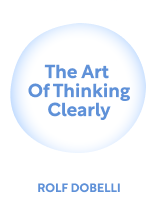

This article is an excerpt from the Shortform book guide to "The Art of Thinking Clearly" by Rolf Dobelli. Shortform has the world's best summaries and analyses of books you should be reading.
Like this article? Sign up for a free trial here .
What is déformation professionnelle? How can having too much experience in your area of expertise limit your perception of the world?
Déformation professionnelle is a cognitive bias resulting from having too much experience in a certain field. It is defined as a tendency to see the world through the lens of one’s profession or area of expertise.
Keep reading to learn about déformation professionnelle bias, why it’s problematic, and how to overcome it.
Déformation Professionnelle: How Expertise Distorts Perspective
Having too much experience, which Dobelli calls “déformation professionnelle,” can cause problems. When you have a lot of experience in a particular field, you form a rubric based on your experience that you follow when identifying and fixing problems. This is an asset when dealing with problems in your field of expertise. However, you apply this rubric when dealing with problems outside your field of expertise, too. This leads you to make irrational decisions or use your knowledge in harmful ways.
For example, soldiers are experts in emotional regulation and efficiency. These rubrics of problem solving are essential to how soldiers think during conflict because they allow the soldiers to act quickly in high-stress situations. However, when they return home, the same rubrics that helped soldiers in the military can damage their relationships. Trying to deal with a crying toddler through emotional regulation and efficiency won’t end well.
To overcome this issue, Dobelli recommends expanding your knowledge to give yourself as many rubrics of behavior as possible. This means you’ll know the best ways to behave in a variety of fields and situations, not just the one you’re an expert in. It’s especially important to compensate for any areas your existing rubrics and expertise leave undeveloped. The soldier, for example, might learn more about the benefits of emotions or how to accept people being less efficient.
Over-Experience, Common Sense, and Morality
As discussed, Dobelli calls having too much experience “déformation professionnelle,” a play on the French phrase for professional training. The idea is that after a certain point, professional training stagnates your growth instead of helping you.
While most people agree with this definition of déformation professionnelle, some take it a step further. They argue that déformation professionnelle erodes your humanity as well as your adaptability. They say the modern focus on professional development means people discard their morals, compassion, and wisdom in favor of advancing their careers.
Even if you ascribe to the second definition, Dobelli’s recommendation to expand your collection of rubrics arguably fits. Forming other rubrics prevents you from focusing solely on professional development, protecting your humanity.
However, not everyone agrees with Dobelli’s recommendation. Some argue that you only need one rubric: common sense. They argue that if you step away from your rubric of expertise and look at your project with common sense, you’ll catch problems that your expertise hid.
That said, making this shift to common sense is very difficult. If you struggle to shift to your common sense rubric, you can also ask a non-expert for help. Chances are, they’ll be able to see a solution since they’re not blinded by expertise.

———End of Preview———
Like what you just read? Read the rest of the world's best book summary and analysis of Rolf Dobelli's "The Art of Thinking Clearly" at Shortform .
Here's what you'll find in our full The Art of Thinking Clearly summary :
- A detailed look at the most common logical fallacies that inhibit decision-making
- How to recognize and overcome these fallacies to make better decisions
- Why you value things for arbitrary reasons






